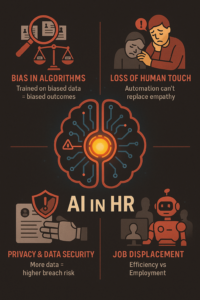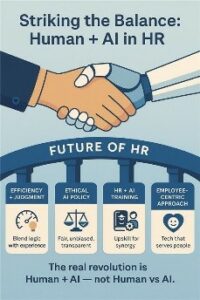AI in HR: Risk or Revolution?

Artificial intelligence (AI) is revolutionizing the face of Human Resources (HR), and with it, new risks and new opportunities. From best-in-class recruitment processes to employee engagement and predictive workforce analytics, AI is becoming an extremely potent HR tool. Where there’s power, there’s also much accountability. Is AI HR’s transformative revolution enhancing efficiency and equity, or an adventurous step towards risking privacy, jobs, and humanness at work? This blog dives deep into how HR is transformed with AI, its rewards and risks, and what leaders need to keep in mind while proceeding on the agenda.
The Revolution: How AI Is Enhancing HR
AI has brought a new wave of automation and intelligence to HR tasks that were once manual, repetitive, and time-consuming. Today, HR departments are leveraging AI in several ways:

- Smart Recruitment: AI-powered systems can screen thousands of resumes in seconds, identify top talent, and match candidates with job roles based on skills and cultural fit.
- Employee Engagement Tools: Chatbots and sentiment analysis tools monitor employee morale and engagement levels, allowing HR teams to intervene in real time.
- Predictive Analytics: Machine learning models can now forecast employee turnover, helping HR proactively plan retention strategies.
- Personalized Learning & Development: AI customizes learning pathways based on individual roles, goals, and performance trends, enabling continuous and relevant upskilling.
These innovations have led to measurable improvements in hiring speed, employee satisfaction, and workforce agility. Companies are finding new value in data that was previously underutilized.
The Risk: Ethical and Operational Challenges
Despite these advancements, integrating AI into HR isn’t without risks. Several critical concerns must be addressed:
- Bias in Algorithms: AI is only as good as the data it learns from. If historical data is biased, AI systems can perpetuate or even amplify those biases in hiring and evaluations.
- Loss of Human Touch: Automated systems may lack the empathy and nuanced understanding required in sensitive HR interactions, such as layoffs or conflict resolution.
- Privacy and Data Security: Collecting and analyzing vast amounts of employee data increases the risk of breaches and ethical misuse.
- Job Displacement: Automation of tasks traditionally handled by HR professionals could lead to job reductions or role redefinitions, raising concerns among HR staff themselves.
Striking the Balance: Human + AI

The future of HR isn’t about replacing humans with machines, it’s about augmenting human capabilities. Organizations that succeed will be those that:
- Combine AI’s efficiency with human judgment
- Design ethical AI policies to mitigate bias and ensure transparency
- Invest in training HR professionals to work alongside AI tools
- Keep the employee experience at the center of all AI initiatives
Conclusion: A Careful Transformation
AI in HR is both a revolution and a risk depending on how it’s implemented. When thoughtfully designed and ethically deployed, AI can empower HR teams to be more strategic, inclusive, and responsive. But the road to transformation must be navigated with care, putting fairness, privacy, and empathy at the forefront.
The question isn’t whether AI belongs in HR, but how HR leaders can responsibly lead this transformation for the betterment of people and performance alike.
By – Aman Yadav